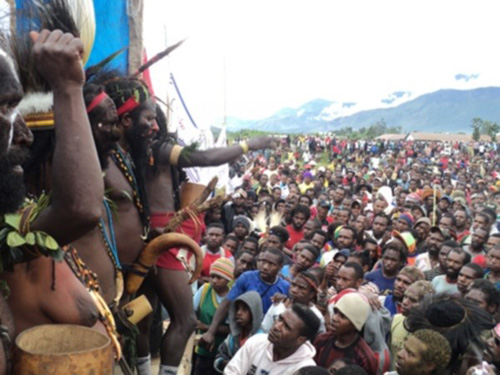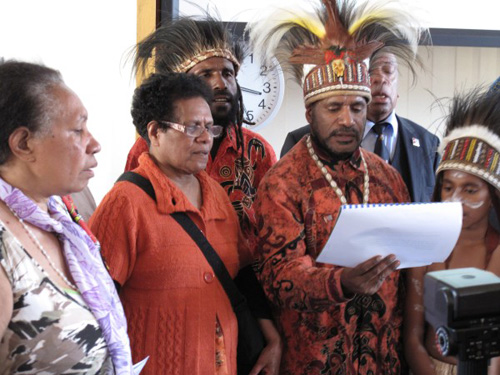This week marks the 48th anniversary of the West Papuan struggle for independence from Indonesia. Thousands have taken to the streets and international lawyers are making a strong case for West Papuan self-rule.

It is a grief-stricken path that has been followed for generations. It stretches from when the Dutch colonized the region in the 19th century and cruelly continued when control was handed to Indonesia by a United Nations Temporary Executive Authority in 1963. And this week the journey towards independence has led thousands of West Papuans onto the streets to demand the international community acknowledge their right to be free.
‘West Papuans will never recognize their homeland as being part of Indonesia and we have a fundamental right to self-determination under international law,’ says Benny Wenda, a West Papua independence leader living in exile in Britain. ‘West Papuans have marched peacefully this week and have shown again that they can meet violence with peace to achieve this [aim], no matter how much [Indonesia] tries to intimidate us.’
‘A blind eye has been most cynically turned by the international community towards the situation of the people in West Papua’
Protesters and human rights campaigners are regularly harassed and arrested in West Papua and, according to Amnesty International, reports of torture whilst in detention and other human rights violations are commonplace. But with momentum building for the cause, the police have been reluctant to intervene in the recent protests.
‘The demonstrations were so big this time they know if they act violently towards the protesters it would be noticed internationally,’ says Wenda. ‘We have been trying for 48 years now and, just like the Middle East, we need people power to change the world – but we also need people from around the world to notice.’
One of the biggest obstacles that the Free West Papua campaign faces is a lack of interest, let alone support, from the outside world.
Forgotten conflict
‘West Papua is a forgotten conflict,’ says Charles Foster, spokesperson for International Lawyers for West Papua. ‘A blind eye has been most cynically turned by the international community towards the situation of the people there.’
As part of efforts to raise the profile of the region, a conference was held in Oxford this week by the Free West Papua campaign. International lawyers and activists spoke at the event to highlight the case for an independent West Papua under international law.

‘In legal terms, the region has a clear right to self-determination,’ says Foster. ‘If you look at the New York Agreement [a treaty signed in 1962 by the Netherlands and Indonesia regarding the political status of West Papua, then known as West New Guinea] the United Nations was given trustee status over the region which was supposed to lead to self-determination in 1969. Indonesia has never disputed the fact it put its name to this agreement; therefore it implicitly acknowledges that it was bound by it.’
But the New York Agreement was followed in 1969 by the ironically titled Act of Free Choice, a vote by a tiny section of the population of West Papua, hand-picked by the Indonesian military, on whether the region should become independent or remain part of Indonesia. Although it has since been widely recognized that the process was a sham, calls for a revote have consistently been ignored.
‘There is no serious legal scholar anywhere in the world who thinks the Act of Free Choice was a genuine expression of the free will of the West Papuan people,’ says Foster. ‘When Indonesians talk about this they try to steer clear of what actually happened on the ground in 1969. They’re not stupid, they realize how embarrassing it is.’
As long as the international inertia continues, the situation for West Papuans continues to worsen
Yet even if the New York Agreement is somehow forgotten and the circumstances surrounding the Act of Free Choice somehow ignored, international law still falls heavily on the side of the West Papuans. In 1960 the UN General assembly passed a crucial agreement, the Declaration of Granting Independence to Colonial Countries and Peoples, which states: ‘All peoples have the right to self-determination; by virtue of that right they freely determine their political status and freely pursue their economic, social and cultural development.’
This firm legal ground has yet to translate into any meaningful concessions to the West Papuan people. And as long as the international inertia continues, the situation for West Papuans continues to worsen.
Clemens Runawery is an exiled independence activist who has been unable to return to his country for more than 40 years.
‘The longer we stay part of Indonesia the more our status will suffer, both physically and demographically,’ he says. ‘Back in 1961 the vast majority of the people in West Papua were West Papuan, with only a minority from other places. Today this situation has been completely reversed. How much time do we really have left?’
#1 Melinus Soo 04 Aug 11
West Papua Freedom Now..?
#2 Ferdinand Okoseray 05 Aug 11
A big vision for all indigenous Papuans in the mission of the struggle for independence of West Papua must be kept alive, realized through the review of 1969 Act of Free Choice in West Papua are not in accordance with the Treaty in New York ... Let us unite fellow people of West Papua, and the conduct of political communication in peace with all peoples, declare to the world that we are no longer colonized by Indonesia ...
#3 AndrewJ 05 Aug 11
You're right that the United Nations "cruelly continued" the colonization of West Papua in 1963, but the UN being an association of world governments it was only able to do so because our governments illegally voted "yes" to UN general assembly Resolution 1752.
Any honest politicians could at least ask our governments, in 1962 did we vote in support of UN General Assembly resolution 1752; did or have we ever obtained legal advise on the legality of resolution 1752; and, does the government know of any resolution or legal process by which the administration of West Papua stopped being an international issue?
#4 YUMMY 05 Aug 11
Priyo Challenge UK Parliament
Posted on 04/08/2011 by admin
JAKARTA, KOMPAS.com - Vice Chairman of the House of Representatives Priyo Budi Santoso challenged the British Parliament which facilitates seminars on Papua by inviting leaders who fight for separatist referendum.
"I was surprised at the initiative of the British Parliament, initiated seminars on Papuan independence," he said in Parliament House Complex Nusantara III, Senayan, Jakarta, Thursday (04/08/2011).
Seminar on Papua was initiated by a number of British MPs who are members of the International Parliementarian for West Papua (IPWP) and the International Lawyers for West Papua (ILWP).
Priyo deplored, why question the merger of the British Parliament as part of the country of Papua Indonesia. In fact, England's own separatist problems, namely the secession movement in Northern Ireland (IRA).
"What do I need or the Indonesian Parliament to do the same, inviting luminaries IRA, encouraging secession," said Priyo.
#5 YUMMY 05 Aug 11
Priyo Challenge UK Parliament
Posted on 04/08/2011 by admin
JAKARTA, KOMPAS.com - Vice Chairman of the House of Representatives Priyo Budi Santoso challenged the British Parliament which facilitates seminars on Papua by inviting leaders who fight for separatist referendum.
"I was surprised at the initiative of the British Parliament, initiated seminars on Papuan independence," he said in Parliament House Complex Nusantara III, Senayan, Jakarta, Thursday (04/08/2011).
Seminar on Papua was initiated by a number of British MPs who are members of the International Parliementarian for West Papua (IPWP) and the International Lawyers for West Papua (ILWP).
Priyo deplored, why question the merger of the British Parliament as part of the country of Papua Indonesia. In fact, England's own separatist problems, namely the secession movement in Northern Ireland (IRA).
"What do I need or the Indonesian Parliament to do the same, inviting luminaries IRA, encouraging secession," said Priyo.
#6 YUMMY 06 Aug 11
President asks Movement clashes Quick Handle
Metro Day / Political and Security Affairs / Friday, August 5, 2011 12:58 AM
Metrotvnews.com, Jakarta: President Susilo Bambang Yudhoyono held a meeting with Governor of National Defense (Defense) Budi Susilo and his staff at the State Palace, Jakarta, Friday (5 / 8). The meeting discussed the revitalization and reform of Defense as an institution that prepared the cadres and leadership at the national level.
During the meeting, the President asked the minister and national defense-related agencies to move quickly to handle the growing number of cases clashes erupted in Indonesia. One of them clashes between residents in Papua. Because of that, the President will hold meetings related to national defense and security issues at around 14.00 pm.
Meanwhile, Governor Budi Susilo Defense recognizes the desire of some areas who want to break away from the Unitary Republic of Indonesia is still a subtle threat. However, he said, it certainly need not allowed.
"The government should pursue social and economic approach, not by force. The government should improve the way the relationship with the community," he said.
#7 YUMMY 06 Aug 11
Priyo: Military Can be deployed in Papua
Posted on 04/08/2011 by admin
JAKABukti customers' rights by the military / peak jaya papuaRTA - To ensure the security and peace of residents in West Papua, following the strengthening of return demands a referendum in Papua, the government could be fielded military forces.
Vice Chairman of the House of Representatives, Priyo Budi Santoso, said, in addressing the demands of the referendum, the Government must be firm. "If I need to not only lose the police there, but also reinforced by elements of the military," he told reporters on Thursday (4 / 8).
Even so, further Desk Chair Aceh and Papua in the House of Representatives, the steps still have to put forward persuasive. But if the referendum is a fixed price Papuan government must firmly to prevent it.
Golkar Party politicians also see the Special Autonomy (Autonomy) Papua is still the best formula to address various problems in Papua which is actually more conducive.
Currently native and immigrant population has been able to coalesce and coexist well. Therefore, if a sudden movement to demand a referendum re-emerge, would be very provocative.
"We are disappointed there is a group of OPM-sponsored mungki who want atmosphere of togetherness has been going well and become damaged. The officer should be more assertive, "he said.
